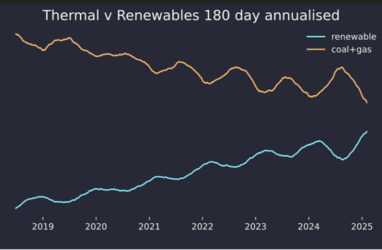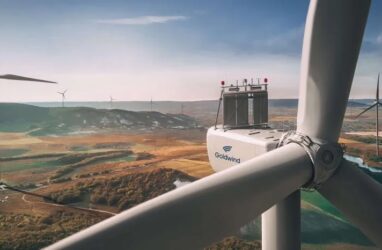Feed aggregator
Poison baits were used on 1,400 feral cats, foxes and dingoes. We studied their fate to see what works
“Putting fatter lines on poles:” Consultation begins on renewable zone for nation’s coal hub
The post “Putting fatter lines on poles:” Consultation begins on renewable zone for nation’s coal hub appeared first on RenewEconomy.
Customers will take as much wind and solar as they can “because they are the cheapest,” says Brookfield
The post Customers will take as much wind and solar as they can “because they are the cheapest,” says Brookfield appeared first on RenewEconomy.
Lies, damned lies and Coalition energy economics: Dutton’s latest nuclear claim slammed
The post Lies, damned lies and Coalition energy economics: Dutton’s latest nuclear claim slammed appeared first on RenewEconomy.
Know your NEM: The jaw tightens as wind and solar gets ready to overtake coal and gas
The post Know your NEM: The jaw tightens as wind and solar gets ready to overtake coal and gas appeared first on RenewEconomy.
Heatwave warning as ‘intensely hot’ weather continues in south-eastern Australia
BoM forecasts high of 39C in Melbourne and 41C in Adelaide with cool change not expected until Tuesday or Wednesday
- Follow our Australia news live blog for latest updates
- Get our breaking news email, free app or daily news podcast
South-eastern states sweltering in a heatwave may be waiting until late Tuesday or Wednesday for a cool change to bring some relief.
Melbourne and Adelaide were in for another very hot day on Monday, after highs of 38C and 39C on Sunday. The Bureau of Meteorology was forecasting Adelaide to reach 41C and Melbourne 39C on Monday, followed by another hot day on Tuesday for both cities.
Sign up for Guardian Australia’s breaking news email
Continue reading...Goldwind promises improved eagle detection at new Tasmania wind project
The post Goldwind promises improved eagle detection at new Tasmania wind project appeared first on RenewEconomy.
What’s behind the deadly, record-breaking floods in north Queensland? | Steve Turton for the Conversation
Some tropical lows are stalling, dumping huge volumes of rain – and climate change is playing a role
- Follow our Australia news live blog for latest updates
- Get our breaking news email, free app or daily news podcast
Record-breaking floods across north Queensland have turned deadly, with one woman drowning while being rescued on Sunday. And the flood waters were still rising, with rain set to continue.
With reports of up to one metre of rainfall in parts of north-east Queensland, the heaviest rain has fallen between Lucinda to Townsville in northern Queensland as the Bureau of Meteorology warns the big wet will continue for days.
Sign up for Guardian Australia’s breaking news email
This article originally appeared in the Conversation. Steve Turton is an adjunct professor of environmental geography at CQUniversity Australia
Continue reading...Scenic loch becomes magnet for Scotland's plastic waste
Endangered frog dads travel 7,000 miles to 'give birth'
Endangered frog dads travel 7,000 miles to 'give birth'
Endangered frogs born at London zoo after rescue mission in Chile
Group of Darwin’s frogs threatened by chytrid fungus thrive in specially built room that mimics their natural habitat
Dozens of endangered froglets have been born at London zoo after conservationists launched an emergency mission to rescue members of the species from a remote national park in Chile.
Researchers rushed to Tantauco Park on the southern tip of Chiloé Island after tests confirmed that the lethal chytrid fungus had reached the nature reserve and threatened to wipe out some of the last remaining populations of Darwin’s frogs.
Continue reading...Australian govt defers nature positive bills until after election
Arctic geoengineering project shuts down over ecological risks, financial challenges
Demolition should be the last resort for Melbourne’s 44 public housing towers – retrofit and upgrade instead
Carbon crediting for peatland rewetting may overestimate climate benefits -study
Airport expansion puts the government on the flight path to years of trouble and strife
On top of the added levels of noise and air pollution, there’s the non-trivial matter of demolishing hundreds of homes, diverting several waterways and rerouting a long stretch of the M25
Ladies and gentlemen, the captain has illuminated the “fasten seat belts” sign. Not only have Sir Keir Starmer and Rachel Reeves run into severe turbulence over Heathrow, the flight deck deliberately steered the Labour plane into storm clouds. That’s an interesting choice for a government that was already buffeted by serious unpopularity and it’s a choice that a lot of their own party are struggling to explain to themselves. Anger about the chancellor’s new commitment to back the expansion of the London airport and others is mingled with bewilderment. A lot of Labour people are scratching their heads trying to work out why she wants to burn political capital on a hugely contentious project that couldn’t possibly be complete until long after she’s done at the Treasury and Sir Keir is gone from Number 10.
It was her choice and his. She didn’t have to make airport expansion the centrepiece of her keynote speech about growth. The prime minister, if his title means anything, could have stopped his chancellor had he wanted to. One consequence of the fury about the subject is that it diverts attention from her more welcome thoughts about how to boost Britain’s growth-starved economy.
Continue reading...Tax on UK incinerators may push councils to send more waste to landfill
Government scheme to penalise pollution from burning rubbish won’t ensure more is recycled, consultants warn
Councils may be forced to send more rubbish to landfill or export it overseas because of a new pollution tax set to be imposed on the UK’s network of waste incinerators.
There are already more than 60 energy-from-waste incinerators across the UK and the Observer revealed in December that as many as 40 new plants are in the pipeline. Many local councils have supported the policy of burning waste, which is cheaper than sending it to landfill.
Continue reading...How can a new runway at Heathrow be good for the planet? | Observer letters
A West End play reveals the way in which powerful vested interests brought about the demise of the climate protocol
In his review of the play Kyoto (“The Kyoto climate treaty is hailed on stage, but reality tells a different story”, Focus), Robin McKie rightly points out that the world is failing dismally to effectively get a grip on the climate crisis.
Richer countries that were part of the Kyoto bloc – mostly European nations – put in place extensive policies to implement the treaty’s legally binding targets: the UK’s 2008 Climate Change Act, widely emulated across the world, is one example. Climate laws multiplied after 1997. All countries with targets met them, renewables spread much more quickly than expected, and emissions in the Kyoto bloc fell by over 20%, at least partly because of these policies.
Continue reading...







